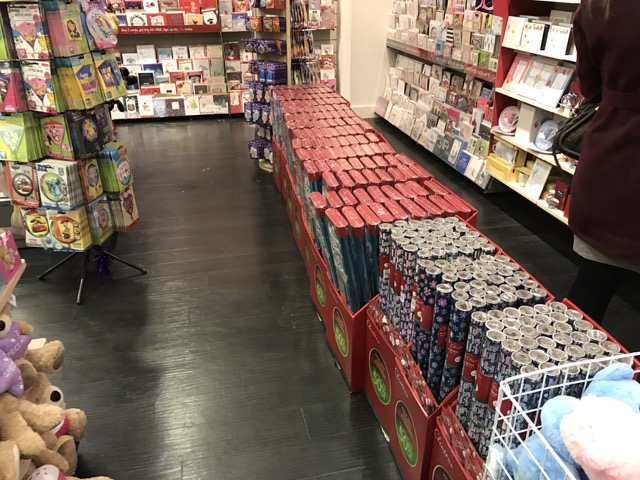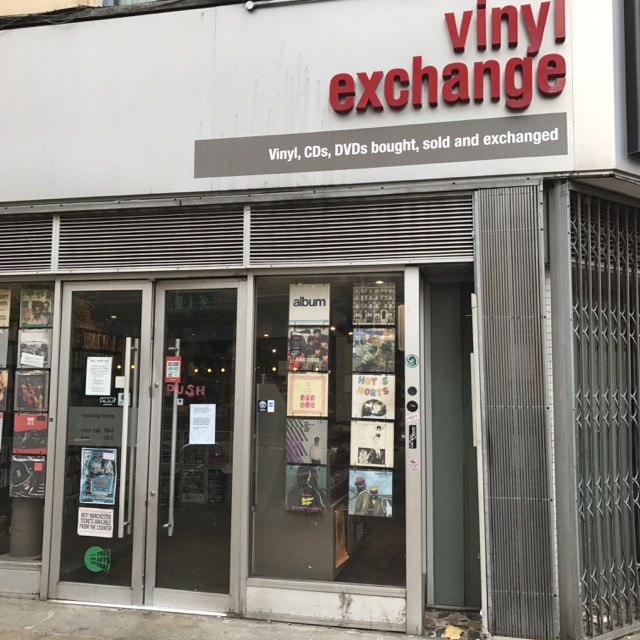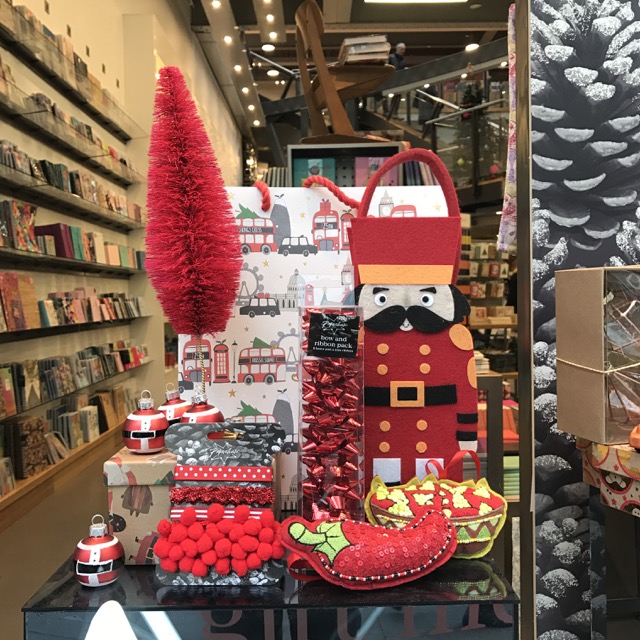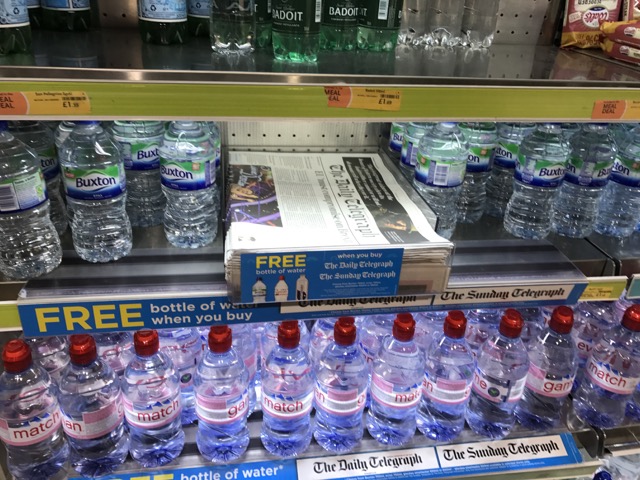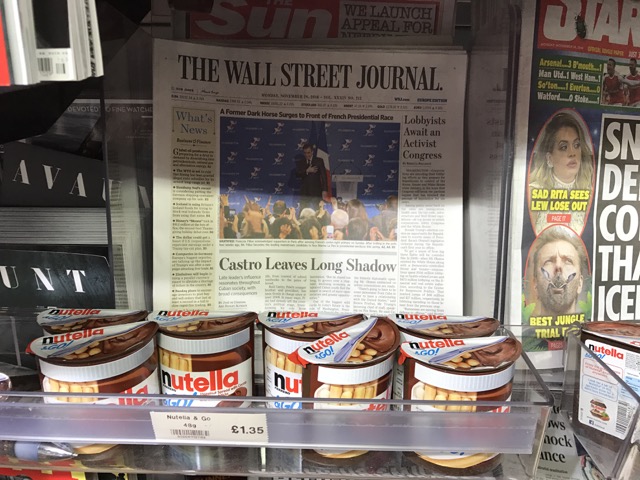GNS CEO apologises to newsagents
Paul Yardley, the new CEO of GNS wrote to newsagents last week:
Hi everyone,
I am writing to introduce myself as the new CEO of GNS. This is my sixth week in the job and I have been fortunate enough to meet some of you already on my travels around the country. I hope to meet many more of you in time.
Let me start by saying “sorry”. GNS is owned by, and operated for, you – and we have not been doing a very good job. If you’re a customer of ours, our service levels have been poor. If you’re a shareholder, our profitability has been unacceptable. That needs to change, quickly, and I have already taken some important steps to start that change.
The stationery market is under intense and sustained pressure. The trends are clear: overall revenues are fragmenting to a broader retailer base and continuing to decline, margins are under pressure and costs continue to increase. We all must evolve to stay relevant. Each part of the industry needs to examine how (and whether) they create value relevant to the end purchaser of the products we make, import, distribute or retail.
I believe GNS has some real strengths – a large, loyal, interested and passionate customer base; employees with many decades’ experience of the industry; a nationwide distribution capability; and a strong balance sheet. These position us really well for the future.
But GNS has to do better. My priorities for us to do that in the short term are:
• We will refocus on our core promise so that orders are fulfilled on time and in full by eliminating delivery delays and out-of-stocks;
• We will put the customer at the heart of everything we do by listening, acting on feedback and understanding how needs differ, so we can service based on those needs; and
• We will drive out all unnecessary cost, wherever it occurs.Earlier in November we completed a major refinancing of the business whereby we sold (and leased back) our NSW warehouse, enabling us to substantially reduce our bank debt and re-invest in inventory. That refinancing has put GNS on a financially secure footing and will support our ongoing improvement.
Over a slightly longer horizon, GNS needs to evolve into a highly efficient logistics business fit to support 21st century retailing. That means GNS needs to change substantially from where it is today, where our current operating model owes more to legacy and history than it does to being “fit for purpose”.
What that means is GNS must become a highly efficient, low-cost operator. We have made a simple task (buy, sell and ship stationery) far more complex and costly than it needs to be. So we will look to simplify our business, automate processes, reduce unnecessary costs and eliminate inefficiency in everything we do. And we will reinvest rapidly in the areas that will add to the end customer: great value product, customer-facing functions, and technology.
I do understand that some recent changes have caused angst, for example the closure of Cash & Carry, but I am committed to listening and responding to concerns on these. While hugely necessary to create the DC efficiencies that will allow reinvestment, I will implement ways to have customers access our warehouses periodically and see new product such as regular open evenings, an annual ‘Market Fair’-type event etc.
We have also overdone the centralisation of some functions vs a state-based approach, and we will look to make some changes to this shortly.
I know the industry has many questions for us as we start our transition. Some of those we can answer today but some require more work. To that end, we are undertaking a major review of all parts of our business and I will update you on the outcomes of that in the first quarter of 2017.
This is a critical time for the industry and for GNS, and it’s an exciting time for me to start working here because I believe the opportunities for GNS far outweigh the challenges. With our refinance complete, a refreshed focus and priorities, and renewed commitment to being the wholesale partner of choice for you, I am looking forward to the future.
I wish you very successful trading through the peak period and assure you of our ongoing support.
All the best,
Paul.
Sunday newsagency challenge: get it in writing!
I’d love a dollar for every story I have heard from newsagents about a supplier rep reportedly claiming something their company does not agree to. If a rep makes a claim or offers a promise, write it down and get them to sign and date it. It is amazing the promises, competitor claims and offers that cannot be put in writing … probably because they are not true.
Unless it is in writing, don’t believe it.
Sunday newsagency management tip: if customers can’t see it they can’t buy it
I know, this seems very basic, so basic in fact that it makes almost no sense to mention it. But mention it I must.
New stock received in your business cannot be purchased unless you take it out of the boxes, receive it into your retail management software, price it and place it on display for customers to see.
This is your job to do. Not a supplier. No, your job.
Do it and the new products you have received may sell. On the other hand, if you prefer, leave the product in the boxes and complain to the supplier that their product does not sell.
Sunday newsagency marketing tip: use regular competitions to drive traffic
Competitions are a terrific way of attracting new shoppers to any retail business.
Key factors in the success success of competitions are:
- Running them regularly.
- Carefully targeting different demographics.
- Not overthinking the process.
- Not being too hung up on the prize.
- Recognising all participants.
- Celebrating winners.
- Promotion outside the business.
I know of small local retail businesses achieving engagement of 500+ in competitions. They have got there by being consistent and following the points noted above.
The best competitions are those you run yourself for your own business. Show yours is a genuinely local business.
Using wrap to guide traffic
One retail stores I visited yesterday used boxes of roll-wrap to guide traffic on the shop floor. It worked a treat. here is how it looked in one part of the business.
This is a simple idea that can work especially well at Christmas time. A manager in this store said this placement was key to them growing wrap sales away from the wrap section.
Christmas shopping in high gear in Manchester compared to Australia
I have been in Manchester in the UK, population 500,000, for the last day and a half and have been surprised by the Christmas shopping traffic. Retailers I have spoken with tell me the traffic will not peak for at least two more weeks. So, this video I shot at one intersection does not reflect peak traffic. I’d love traffic like passing my door this time of the year.
And we thought vinyl was dead
Ten years ago few could imagine the resurgence vinyl records would have. Within a couple of minutes of each other I found three shops yesterday in Manchester in the UK. Each has a point of difference yet overall serves people with a common interest. I share the photos to show that what may be losing interest today for many businesses could be successful in the future for fewer businesses.
Selling magazine subscriptions in the newsagency
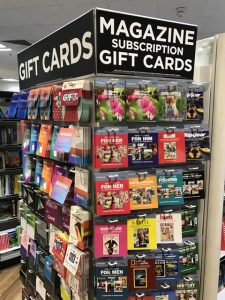 WH Smith stores in the UK sell magazine subscriptions like this now. Years ago, they were in a box on a spinner. Now, they are placed with gift cards, taking up less space and better located in-store. That they still offer subscriptions today suggests there is money in it for them. There have been several goes at newsagents selling magazine subscriptions like this in-store in Australia over the years. None has worked I think because it has not been more than one or two titles.
WH Smith stores in the UK sell magazine subscriptions like this now. Years ago, they were in a box on a spinner. Now, they are placed with gift cards, taking up less space and better located in-store. That they still offer subscriptions today suggests there is money in it for them. There have been several goes at newsagents selling magazine subscriptions like this in-store in Australia over the years. None has worked I think because it has not been more than one or two titles.
Has News Corp sought to modify your General Store Agreement?
I am aware of News Corp. contacting a newsagent with four pages of amendments to the General Store Agreement. I am curious if any other newsagents have been approached and if so what did you do about it? I’m happy to receive an email response rather than commenting publicly here. mark@towersystems.com.au.
A terrific window display sure to attract shoppers
I love this Christmas window display from the team at newsXpress Bairnsdale for it pitches the business outside of what people might expect from this shop, it is fin and inspiring.
This is what the front window is all about, especially for retail businesses in high street situations country towns where attracting impulse visits depends on the window display.
This window display says come on in, this is a fun place to shop. Most important, the window appeals to kids and anyone who buys for kids and this time of the year that is most important.
The best place to start to redefine any retail business is from the front window. Start there, set your messaging and then work this into the business. Of course, any strategic change should start deep within the business, however, starting with the front window can unlock inspiration that demands to be addressed in the business itself.
This window display at newsXpress Bairnsdale is excellent, a proud representation of optimistic retail.
I hope it inspires plenty of newsagents to work on their window.
Why I am at Slush 2016 in Helsinki
Our world has changed forever. By our world I mean the newsagency world. Changes are not stopping either. Indeed, I think the pace of change has picked up.
One of the best places to see beyond changes we are confronted by today is a place focussed on the future. That is what Slush 2016 is – a gathering of 17,000+ people talking about start-ups. There is no better place to contemplate the future than in an environment dedicated to the future.
While many of the start-ups have nothing directly to do with what newsagents do, plenty relate to changes we can contemplate – such as changing tracks to serve how people will consume in the future compared to how they consume today.
Slush 2016 is proving to be a good place to think about these things, to contemplate change, the urgency of change and what our businesses may look like. I get that some like the traditional newsagency. Nostalgia is something to appreciate. However, it may not pay the bills – not for enough newsagents at least.
There is nothing like this back in Australia. If we see a story on TV or in a newspaper about change it is already old. It is at start-up events like Slush where you hear about the idea while it is still fresh.
To set the scene, here is a brief clip from the amazing opening:
This blog is not the place for me to share specific takeaways, of which there are many – personal and business.
Here are some photos from the event.
This session on dying was extraordinary.
Low-cost for lottery retailers in Finland
 I checked out plenty of lottery outlets in Helsinki today. The only fit out apparent was the stands you see in the photo. Low key and low cost. The burden on Aussie newsagents of the fit out requirements is extraordinary. It is made worse by the double standards with small business having a what looks like higher cost obligation than big business. In Finland all look the same and all are low cost.
I checked out plenty of lottery outlets in Helsinki today. The only fit out apparent was the stands you see in the photo. Low key and low cost. The burden on Aussie newsagents of the fit out requirements is extraordinary. It is made worse by the double standards with small business having a what looks like higher cost obligation than big business. In Finland all look the same and all are low cost.
Bauer to close print edition of Dolly magazine
The December 5 issue of Dolly magazine will be the last. The masthead will continue online but for print, this is the end.
This move was only a matter of time. In 2012, Dolly was selling 90,000+ copies an issue. This year, it has been selling 30,000.
The announcement by Bauer Media to close the print edition of Dolly comes just after Pacific Magazines announced the closure of the print edition of Girlfriend.
It is a tough time to be a magazine publisher. 2016 has been a difficult year. The sales and closures have been necessary as publishers tune their businesses for changed circumstances.
The demographic served by Dolly and Girlfriend consumes information differently today than in 2012 when Dolly’s circulation was three times what it is today. In addition to this, the product brands that supported the print product back then now have their own direct to consumer channels that mean they are less reliant on the magazine brands that ‘owned’ the channel to the consumer back then.
This is digital disruption in several levels – the delivery of access to news and curated content and the disruption from brands owning and running their own direct to consumer channels.
The question for newsagents is what have you done to ensure your business attracts the Dolly / Girlfriend shopper?
The closure of the titles will not cause a significant drop-off as that has happened since 2012. What have you been doing to appear to these shoppers as you need them given the ageing population – you need new people in your pipeline?
While the closures are confronting, there are launches of more long-tail titles that present us with opportunities in specialisation. I have received three submissions this week from Australian publishers launching new niche titles into the marketplace, publishers only relying on the newsagency channel to reach their prospective readers, publishers with little or no focus on subscriptions.
While the low margin on magazines is a major challenge for gaining newsagent interest, the opportunity to be a specialist, and through that to attract new traffic, is appealing. Magazines are important to our businesses. We should welcome launches and help those titles find readers, especially the titles that sell exclusively in the newsagency channel.
Footnote: For an excellent article on the Dolly move, read Miranda Ward’s article at Mumbrella.
Are newsagents as obsessed with possible Fairfax newspaper closures as News Corp?
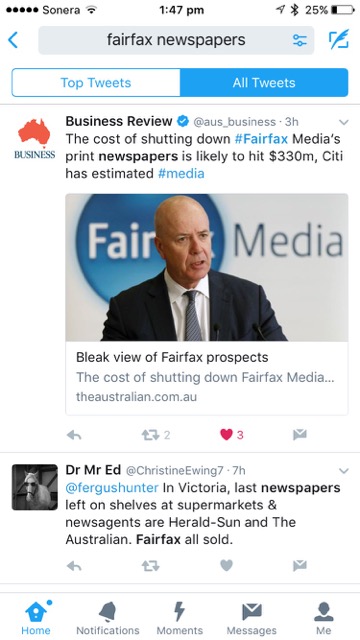 I have no doubt we will soon hear from Fairfax that they plan to cease daily publication of some or all of their capital city daily newspapers. The circulation numbers are such that several days a week the production and distribution costs are not covered by sales and ad revenue.
I have no doubt we will soon hear from Fairfax that they plan to cease daily publication of some or all of their capital city daily newspapers. The circulation numbers are such that several days a week the production and distribution costs are not covered by sales and ad revenue.
I suspect the future structure of the total Fairfax business will play a role in the timing of any announcement. There are reports of discussions with Nine Entertainment.
Fairfax is not the only newspaper publisher in Australia or the world facing the challenge of the future of its print product.
Every newspaper is in the same boat thanks to the disruption driven by mobile technology and social media that has fundamentally altered how, when and where we consume news.
There is a new challenge to what constitutes news. Thanks to better data on what people read, news outlets are more prone today to publish fake news, junk content and puffery than they would have back when they only had the print product. Publishers are pandering to what people like rather than publishing news.
You only have to look at the US election to realise the crisis confronting news outlets. News is not valued as it once was. We are in an era of celebrity where the opinions of a few matter more than irrefutable facts. The opinions of these few are soon spread as news thanks to the megaphone of social media.
This shift has been driven by social media platforms such as Facebook, Twitter and Instagram and the opportunity for everyone to be a publisher, an immediate, unedited, unmoderated publisher.
Ad revenue is a problem for print newspapers. It has all but collapsed for print newspapers. Okay, maybe collapsed is too dramatic a term. But it has declined considerably year on year for several years. This challenges the model of the physical product.
Also, Today there is a proliferation of news outlets we did not have in Australia just a few years ago.
If the numbers don’t work, the publisher has to make the tough call. It is all about the numbers.
As is their want, News Corp. is obsessed with when Fairfax will transition from daily publishing of the print product to another model. Their latest report, in The Australian, claims a cost of $330M projected by Citi, to be faced by Fairfax of they make such a move.
The obsession by News is not unusual given the rivalry between the two publishers and that Fairfax has more respect as a trusted news publisher than News. If News was committed to news, The Australian would report on the company’s own considerations and plans. I expect there are daily newspapers in its stable that do not pay their own way today, newspapers delivering mounting financial losses to the company’s balance sheet – if only the results were reported so this could be seen.
While this is interesting to watch, newsagents need to act. These changes are coming. Soon, daily newspapers will disappear, not all, but certainly some. When that first one goes, it will be a shock to many newsagents. It should not be a shock though. Smart newsagents have new traffic strategies in place that are bringing in new customers to purchase non circulation items.
What does your business look like without newspapers?
How do you consider yourself running a business without newspapers?
Are you ready in terms of your business plan?
Are you ready for how your bank will react?
Are you ready for how your landlord will react?
Are you ready for the doom and gloom reports that will defend upon the channel when the first paper closes? Can you weather it because it will be tough with our channel more tightly aligned with newspapers than any other single retail channel in Australia.
Are you working on your business now so it is ahead of the wave of change that will follow any closure of a major daily newspaper?
Or are you waiting for it to happen before you make any moves? If this is you, that approach will be too late.
Acting today involves placing newspapers in the most cost effective location in-store and reducing the visual impact of papers to messaging for your business. It requires you to engage with multiple strategies for attracting new shoppers into the business. And it involves you re-casting the image of your business in your external marketing. These points are just the start.
Look at your business data. Understand the role newspapers play: How often are newspapers purchased alone versus with other items? This and related analysis can help you understand the impact should daily newspapers cease in your area.
The report in The Australian is not relevant to the timing as Fairfax will make the decision based on the economics of the print operation – just as they have made decisions to cut their workforce several times in recent years based on operating costs. The cost of the decision is a cost of business, to be borne over time.
How newspapers are promoted in-store in the UK
At a WH Smith store in a transit location in the UK earlier today I noticed this small stack of The Daily Telegraph newspaper placed in the fridge next to the water. While the water is the free item when you purchase the newspaper, the placement and design of the signage made me think the paper was free with water purchase. Maybe that is deliberate as travellers might be more likely to purchase water than a newspaper.
On the back wall of the shop I found the newspaper section. I like the placement of candy in front of newspapers. This tactical placement makes sense for driving a deeper basket. While the fixture is old and partially blocks the view of the paper, the move is smart.
I am curious about the choice of product placement with newspapers. The Wall Street Journal and Nutella – who’d have thought?
I wonder how many newsagents in Australia actively place non circulation items with newspapers to drive a deeper basket? Small moves like these matter. If you look at supermarkets, they do the tactical placement for a deeper shopping basket well.
Yes, the Gotch allocations system is broken
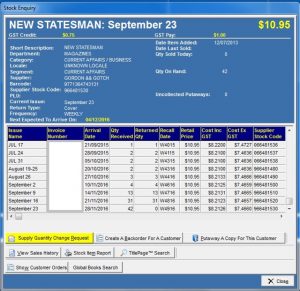 Last week I wrote about a newsagent being sent 31 copies of New Statesman, up from the usual 3 or 4. This week they have been sent 42 copies. Here is the evidence of escalating oversupply by Gotch. 3 or 4, then 13, then 31 and now 42.
Last week I wrote about a newsagent being sent 31 copies of New Statesman, up from the usual 3 or 4. This week they have been sent 42 copies. Here is the evidence of escalating oversupply by Gotch. 3 or 4, then 13, then 31 and now 42.
What a waste of time and money.
last week I thought the 31 might be a transposition of 13 from the previous issue. I have no explanation for 42 other than the Gotch system being broken.
Their competitor is gone. They have one job – to get allocations right. And now this.
I feel for the publisher and their investment wasted in at least 40 of these copies.
Cloud based school booklist software for newsagents helping newsagents win school books business
Months ago my software company launched Booklist, a cloud based school booklist management solution designed to help newsagents more effectively compete against big businesses chasing school book list business. The goal was to provide newsagents a facility through which they can be seen by customers as more up to date and through which they can cut the time it takes to manage booklist orders.
Newsagents have had direct input into the facility as it has been enhanced over the last couple of months.
Using the site, newsagents can:
- Setup a school.
- Setup classes in a school and load all the booklist requirements.
- The booklist items could be loaded by a CSV file. You would record item description, price, supplier and supplier stock cost.
- You would setup order close dates.
- Plus you would have the ability to note when an order is ready for collection.
- The site would allow for you not having stock, thereby adjusting the amount to be collected.
- Share a link for parents to sign up and add their kid(s) to a class and to either take the whole booklist or select what they want.
- The site would allocate logins to parents so they would have access to their order.
- Receive payment from the parents.
- Alternatively, the site would give the transaction to your Retailer software for payment by the parents in-store.
- Export a file of all items required to fulfil booklists, by supplier and by school. CSV you could load into Excel.
- Report on total revenue by school and class.
- The site would be accessible by desktop, tablet and phone.
In addition to the per year fee there is a small card processing fee, on a cost recovery basis, for payments made online.
Here are the enhancements guided by newsagents:
- Category Sorting to enable easier management.
- Picklist production for product picking.
- Group products by category in the store booklist page.
- Display the store ABN on the store page, and allow store to edit their ABN from store backend
- Allow store to adjust the display order of products in the store booklist page
- Allow store to create different prices to booklist per school
- Display store contact phone and fax number on the store page
- Allow store to manually create/update category from the store backend
- Allow store to manually drag and drop the marker on Google Map to the correct position, if the store location is not showing correctly on Google Map
- Allow store customer to reset their login password via forgot password page
- Added validation to Pin Payment API Keys field to indicate store if invalid API details entered
- Added “Booklist Review” step, before store confirm to create the school booklist.
- Fixed the website URL from frontend.booklist.com.au to www.booklist.com.au
From this project it is clear there is no one approach to managing school book list sales. The developers at my company and sought to address the most common and commercially viable needs to provide a cost effective solution for newsagents.
To access the preview please follow these instructions.
- Go to the website: http://www.booklist.com.au.
- Click on login.
- Enter user name: demo.
- Enter password: booklist.
- Any questions, email help@booklist.com.au
If my first job in a newsagency decades ago I packed school book orders. I remember the manual accounting process well. My hope is this cloud based facility encourages more newsagents back into this area newsagents once owned.
Officeworks pushing hard for Back to School
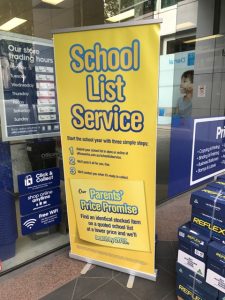 Officeworks is making their usual big noise about back to school for the 2017 year. Their centrepiece claim is the price match offer – to beat the price on a booklist by 20%.
Officeworks is making their usual big noise about back to school for the 2017 year. Their centrepiece claim is the price match offer – to beat the price on a booklist by 20%.
Many schools enter into booklist fulfilment arrangements as a means of raising funds for the school. Parents buying outside the preferred arrangement can reduce funds available to the school, meaning they may end up paying the gap through other fees.
This is why I see the Officeworks 20% discount offer as being false economy. It all depends on the school funding arrangement in place with the booklist partner, which is often a local family run newsagency business that invests back in the school and the community.
Newsagents doing booklist fulfilment work need to more actively talk about their financial support for the school and the community – to counter the Officeworks 20% saving claim.
Discounts by big businesses come at a cost somewhere but I suspect usually not at a cost to the big business. We hear about the pressure supermarkets place on farmers and other suppliers – they fund the supermarket discounts that the supermarkets claim to give to consumers.
This 20% discount offer by Officeworks on school booklist items feels like that – a discount that is not real as someone somewhere ends up paying for it. It could be the parents who actually pay over the course of the year.
My advice to newsagents doing booklists and who offer a rebate or other benefit to the school – be open about this, let parents know the good being done by supporting your business.
Sunday newsagency marketing tip: 40 Christmas marketing ideas
Each year, my POS software company, Tower Systems, publishes Christmas marketing tips for independent retailers. Here is this year’s list:
- Make it easy. People often talk about how hard Christmas is. Be the local business that makes it easy. The ways to do this are with easy Lay-By, free wrapping, better shop floor help, guide buying advice or tips on perfect gifts no one else will think of. Consider making Christmas easy as being a key part of your messaging.
- Be thrilled people are in your shop. Your personal smile or greeting is something they may not see in a big business where employees are less invested in each shopper and where the owner is usually thousands of kilometers away.
- Make the giving easy. If people purchase items from you to send somewhere else. Offer a one-stop shop. Save them the trip to the post office.
- Make the shop less about Christmas. Consider pulling back on the Christmas visual noise. Go for something simple, muted, respecting the season but making a calm statement. Consider declaring the shop a Christmas carol free zone – not because you hate carols but because you want to help customers take a break.
- Help people rest and recharge. Create a Christmas shopping rest and recovery zone. Offer free tea, coffee, water and something to eat. Encourage people to take a break in your shop – without any obligation for them to spend money with you.
- Let your customers help each other. Setup a whiteboard or sheets of butcher’s paper, yes keep it simple. Get customers to write gift suggestions under different age/gender groups. For example: Girls 18 – 25, Boys 55+. Encourage your customers to help each other through their suggestions.
- Make price comparison difficult. If you sell items people are likely to price compare with other businesses, package them so price comparison is not easy. Put items into a hamper as a perfect Boy 8 to 12 bundle for example. Or offer the item with pre packages services if appropriate for an item.
- Less is more. The stack em high watch em fly mantra can be wrong. Indeed, it is often wrong in retail. Shoppers can be store blind because a shop is too full or a display is too busy. Consider creating simpler less cluttered displays and window promotions. Draw attention to what you want people to see by promoting that one thing. Every time someone asks if you have something that you think through should be able to find easily – take it as a challenge for you to address rather than a commentary on a facility of the customer.
- Change. Christmas season in your shop should evolve. Major change weekly is vital for people to see what you have that they could buy.
- Be socially engaged. On Facebook, Instagram, twitter and elsewhere, be the calm voice, the person people enjoy reading or seeing photos from. Provide entertainment this Christmas rather than the usual retailer shrill of come and shop here!
- Be community minded. Choose a local charity or community group to support through Christmas. Consider: a change collection tin at the counter; a themed Christmas window display; promotion on your social media pages; a donation to their work; a collection point for donations from customers.
- Facilitate sharing stories. Find space in your shop for customers to share their Christmas stories. It could be a story wall inside or in front of the shop. This initiative encourages storytelling by locals and better connects the business with the community.
- Award a prize at a local school. Fund a year-end prize at a local school. Attend a school assembly to award the prize. Work with the school leadership on a prize appropriate to your business.
- VIP preview. Host a VIP shopper preview night when you show off your Christmas ranges ahead of being available to the general shoppers. Respect and reward your local shoppers with deals and the opportunity to preview ahead of others.
- Leverage Christmas traffic. Encourage the Christmas shopper traffic surge in after Christmas. Give them a reason to come back. A coupon promotion or a discount voucher on receipts could be the enticement to get shoppers back in-store. Note: the Tower POS software produces discount vouchers to rules you establish.
- Become a gallery. Work with a school, kindergarten, community group or retirement village to bring in local art for people to come and see through Christmas. A small space commitment can drive traffic from family and friends of those with art on show.
- Dress the shop. Fully embrace Christmas. Create a Christmas experience such that shoppers know they have stepped into somewhere special this Christmas. Go for more than some tinsel and a tree. Fully embrace the opportunity.
- Make your shop smell like Christmas.
- Send cards. Send Christmas cards early in the season to suppliers, key customers and local community groups. This connects you with Christmas. Invite all team members to sign each card.
- Host a Christmas party. For shops nearby. You are all in the season together – let your hear down before things get crazy.
- Ensure you have gifts targeted at occasions. For example: Kris Kringle, by price point and by recipient. Make it easy for people to know what they could give.
- Stocking stuffers. At your counter always have one or two stocking stuffers for impulse purchase.
- Offer gift vouchers – for someone to give when they are not sure what to give.
- Be local. Ensure you have a selection of locally sourced products available for purchase. Make it clear in-store that these products are sourced locally.
- Tell stories. On your Facebook page, talk about what is important to you at Christmas. Personalise the season and deepen the connection with those who could shop with you.
- Offer a free gift. Bulk purchase an item to offer those who spend above a set amount. For example, spend $65 and receive XX where XX may have cost $5.00 but could have a perceived value of $20.00.
- Keep it fresh. Every week make significant change to your Christmas displays and promotions to keep your offer fresh.
- Share Christmas recipes. Each week for, say, four weeks, give customers a family Christmas recipe. This personalises Christmas in your business, creates a talking point and makes shopping with you different to your bigger competitors.
- Free wrapping. Sure, many retailers offer this. Make your offer better, more creative and more appreciated.
- This is essential in any business. Manage it through your computer system with strict rules.
- Work the floor. Increase time on the shop floor. Be present to manage shopper flow and to facilitate purchases.
- Christmas is crazy busy I most retail situations. Give yourself and your team members sufficient time to recharge so the smile greeting shoppers is heartfelt.
- Keep a secret. If yours is a business selling gifts a partner may purchase for their loved-one, create some mystery with a closed off display for the shopper to see the products.
- Free assembly. If you sell items that require assembly. Offer to do this for free.
- Free delivery. Offer free Christmas Eve delivery for items purchased for kids for Christmas.
- Sell training. Leverage the specialist knowledge you have in your business by selling as gifts places at classes you run sharing your expertise.
- Hold back. Don’t go out with everything you have for Christmas all at once. Plan the season to show off what you have as the season unfolds. This allows you multiple launches.
- Share a taste. Regardless if your type of business, bake a family recipe of Christmas cake, Christmas pudding or Christmas biscuits and offer tastings to shoppers on select days. This personalises the experience in your shop.
- Offer hampers. Package several items together and offer them as a hamper. Time-poor shoppers could appreciate you doing this work for them. We have seen this work in many different retail situations.
- Buy X get Y. Encourage people to spend more with a volume based deal. Pitched right, this could get customers purchasing items for several family members in order to get the price offer you have. Use your technology to manage this.
Christmas is the perfect time to plan for next year. It is the time to do everything possible to leverage bonus Christmas traffic to benefit your business through next year.
Tower Systems offers Point of sale / retail management software tailored for your specific type of retail business. Our software can help you leverage Christmas traffic for year-long benefits.
Sunday newsagency management tip: file your contracts!
Every agreement you sign, every contract, every supplier offer – keep a copy, filed in a central place. Saying you can;t remember if you signed a contract is no excuse just as not being able to find an old contract is no excuse.
Be serious about your record keeping and this will help you stay out of trouble in the future.

